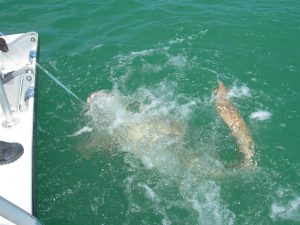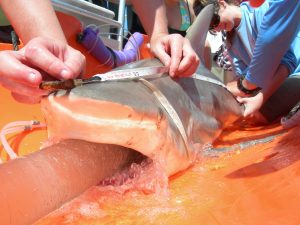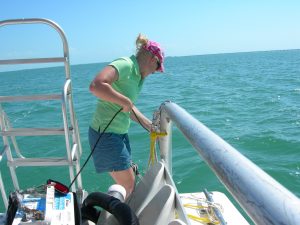The Sharking Continues!
Friday, February 25th 2011
Preparation for the trip this morning was carried out with efficiency and enthusiasm. Interns and students alike were itching to get out on the water and start bringing in the sharks for a yet another season of research. There was an unmistakable excitement in the fresh early morning air that built as the Miami-Dade College students volunteered to load the bait crates with our collection of assorted fish parts. Watching them jump in to help without hesitating at the sight of sliced fish reassured us that this was going to be a fantastic day for catching sharks.

The level of anticipation was high and all smiles as the hooks were being baited and dropped. Click to enlarge.
When all was ready, we set forth on our way seaward. Everyone pitched in when the time came to set the drumlines out with the tasty fish steaks attached. An efficient round of setting the lines brought us to our lunch break right on schedule. We used the opportunity to get to know the students, share shark stories, answer questions about sharks and shark research, and demonstrate exactly what should happen should we catch one. The atmosphere became electric as soon as the time came to pull back around to the first line.
One of the things we have to deal with is nature’s biting sense of humor. All of the buildup for catching sharks started to fade after 9 consecutive lines were pulled up empty. Just as hopes were starting to fall, I felt a good deal of tension on the 10th line. Sure enough, a 7ft nurse shark was on the other end.

A total of 4 nurse sharks were pulled in today. All of them were large and were therefore not brought on deck. Click to enlarge.
Like clockwork, everyone assumed their proper positions and we geared up with the tail rope. Nurse sharks have tougher skin than other species thus we can not take a muscle biopsy. They are notorious for being rambunctious, making it difficult to safely bring the larger ones on board, hence the decision to use the tail rope and take our data without pulling the shark out of the water. After a bit of a fight, we successfully brought the nurse to the boat and, using the tail rope, stabilized it carefully and without causing it harm. Measurements were taken and morale was boosted as each student was able to come and feel the rough scales of this bottom-dweller.

Here, a blacktip being measured. The pump in its mouth allows seawater to flow over the gills enabling the shark to maintain normal oxygen levels. Click to enlarge.
We let the shark go and with a renewed vigor proceeded to the next drumline. Throughout the rest of the day we pulled in 3 more nurse sharks, two blacktips, and one lemon shark. The nurses tested our strength and tail-roping abilities, while the blacktips and lemon we were able to bring aboard. All measured, sampled, and tagged with the precision and efficiency expected of our experienced team. The season looks promising.
Best,
Robbie Christian, RJD Intern


Very neat pictures like always. That tube in the shark is pretty neat, thanks for mentioning that I was beginning to wonder..